Organizational Behavior: Culture, Power, and Motivation at John Lewis
VerifiedAdded on 2023/01/11
|22
|6157
|98
Report
AI Summary
This report provides an in-depth analysis of organizational behavior within the context of the John Lewis Partnership. It explores the influence of organizational culture, power dynamics, and politics on both team and individual behavior and performance. The report delves into various aspects of organizational culture, including power, role, task, and person cultures, and how these impact workplace dynamics. Furthermore, it examines the application of motivational theories, such as Alderfer's ERG theory and Vroom's expectancy theory, and motivational techniques to enhance staff performance. The report also discusses team development theory, the factors that influence effective teamwork, and the benefits of team collaboration. Finally, it concludes by summarizing the concepts and philosophies of organizational behavior within the company, offering insights into how to improve staff performance and achieve organizational aims. This report is contributed by a student and published on Desklib, a platform that provides AI-based study tools for students.
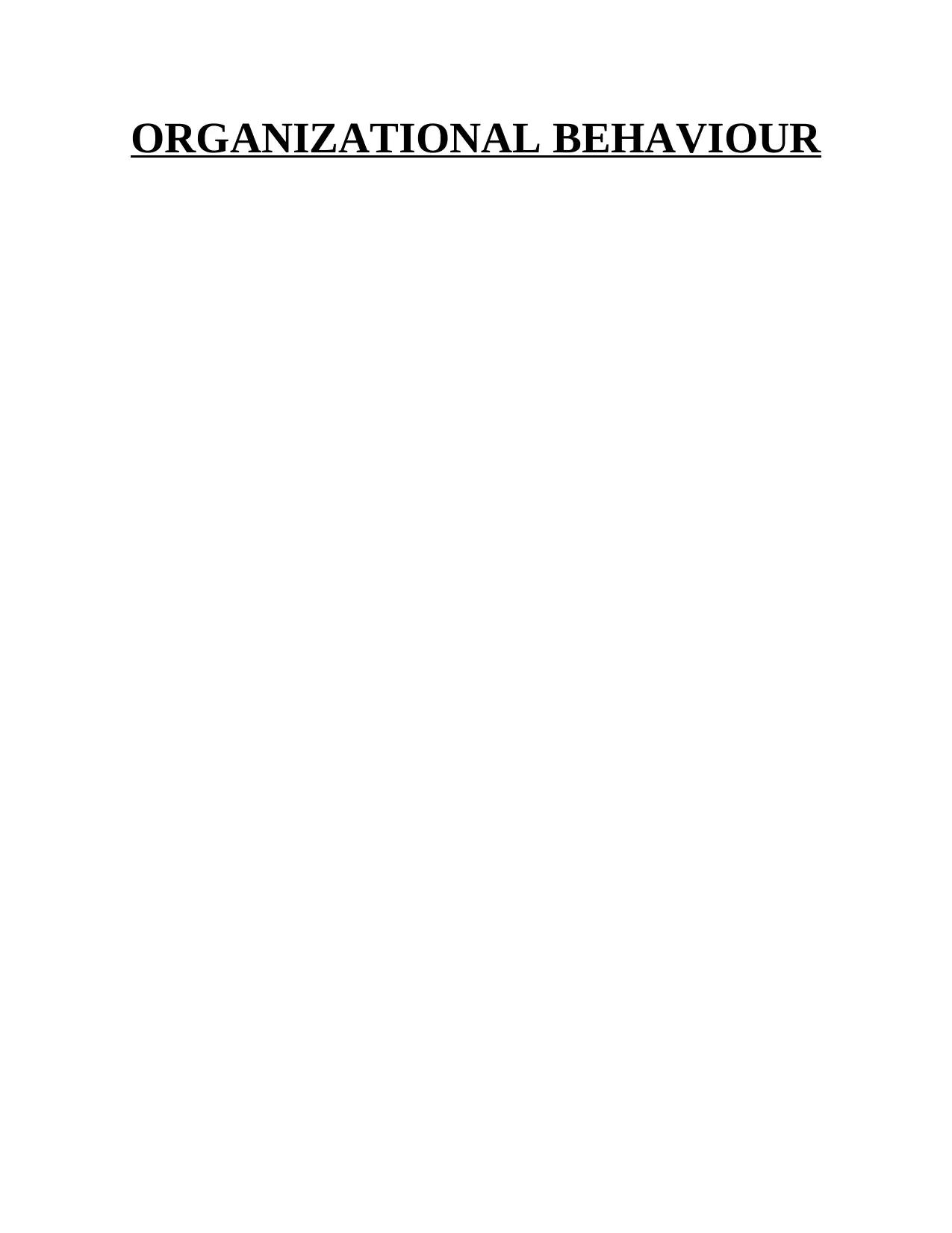
ORGANIZATIONAL BEHAVIOUR
Paraphrase This Document
Need a fresh take? Get an instant paraphrase of this document with our AI Paraphraser
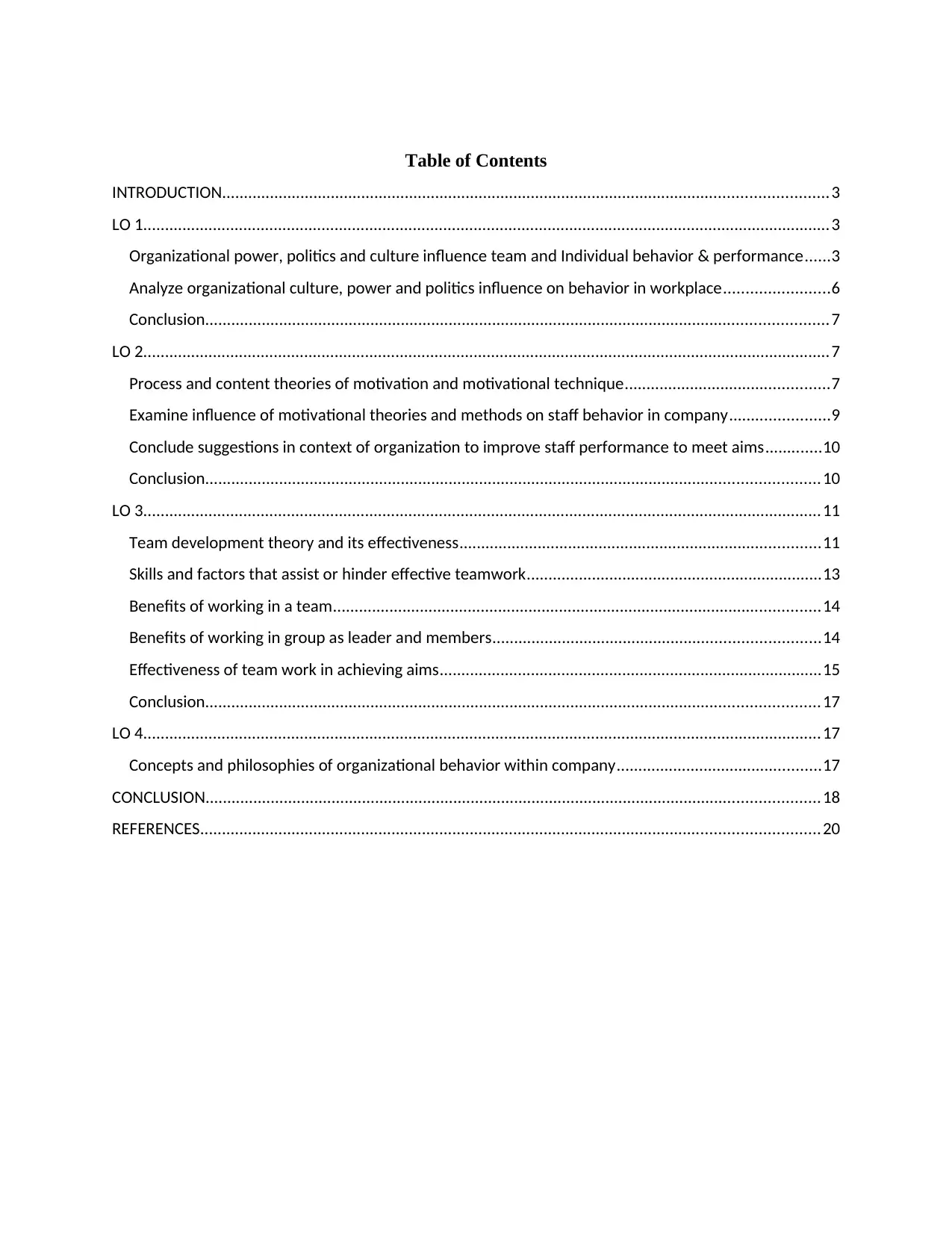
Table of Contents
INTRODUCTION...........................................................................................................................................3
LO 1..............................................................................................................................................................3
Organizational power, politics and culture influence team and Individual behavior & performance......3
Analyze organizational culture, power and politics influence on behavior in workplace........................6
Conclusion...............................................................................................................................................7
LO 2..............................................................................................................................................................7
Process and content theories of motivation and motivational technique...............................................7
Examine influence of motivational theories and methods on staff behavior in company.......................9
Conclude suggestions in context of organization to improve staff performance to meet aims.............10
Conclusion.............................................................................................................................................10
LO 3............................................................................................................................................................11
Team development theory and its effectiveness...................................................................................11
Skills and factors that assist or hinder effective teamwork....................................................................13
Benefits of working in a team................................................................................................................14
Benefits of working in group as leader and members...........................................................................14
Effectiveness of team work in achieving aims........................................................................................15
Conclusion.............................................................................................................................................17
LO 4............................................................................................................................................................17
Concepts and philosophies of organizational behavior within company...............................................17
CONCLUSION.............................................................................................................................................18
REFERENCES..............................................................................................................................................20
INTRODUCTION...........................................................................................................................................3
LO 1..............................................................................................................................................................3
Organizational power, politics and culture influence team and Individual behavior & performance......3
Analyze organizational culture, power and politics influence on behavior in workplace........................6
Conclusion...............................................................................................................................................7
LO 2..............................................................................................................................................................7
Process and content theories of motivation and motivational technique...............................................7
Examine influence of motivational theories and methods on staff behavior in company.......................9
Conclude suggestions in context of organization to improve staff performance to meet aims.............10
Conclusion.............................................................................................................................................10
LO 3............................................................................................................................................................11
Team development theory and its effectiveness...................................................................................11
Skills and factors that assist or hinder effective teamwork....................................................................13
Benefits of working in a team................................................................................................................14
Benefits of working in group as leader and members...........................................................................14
Effectiveness of team work in achieving aims........................................................................................15
Conclusion.............................................................................................................................................17
LO 4............................................................................................................................................................17
Concepts and philosophies of organizational behavior within company...............................................17
CONCLUSION.............................................................................................................................................18
REFERENCES..............................................................................................................................................20
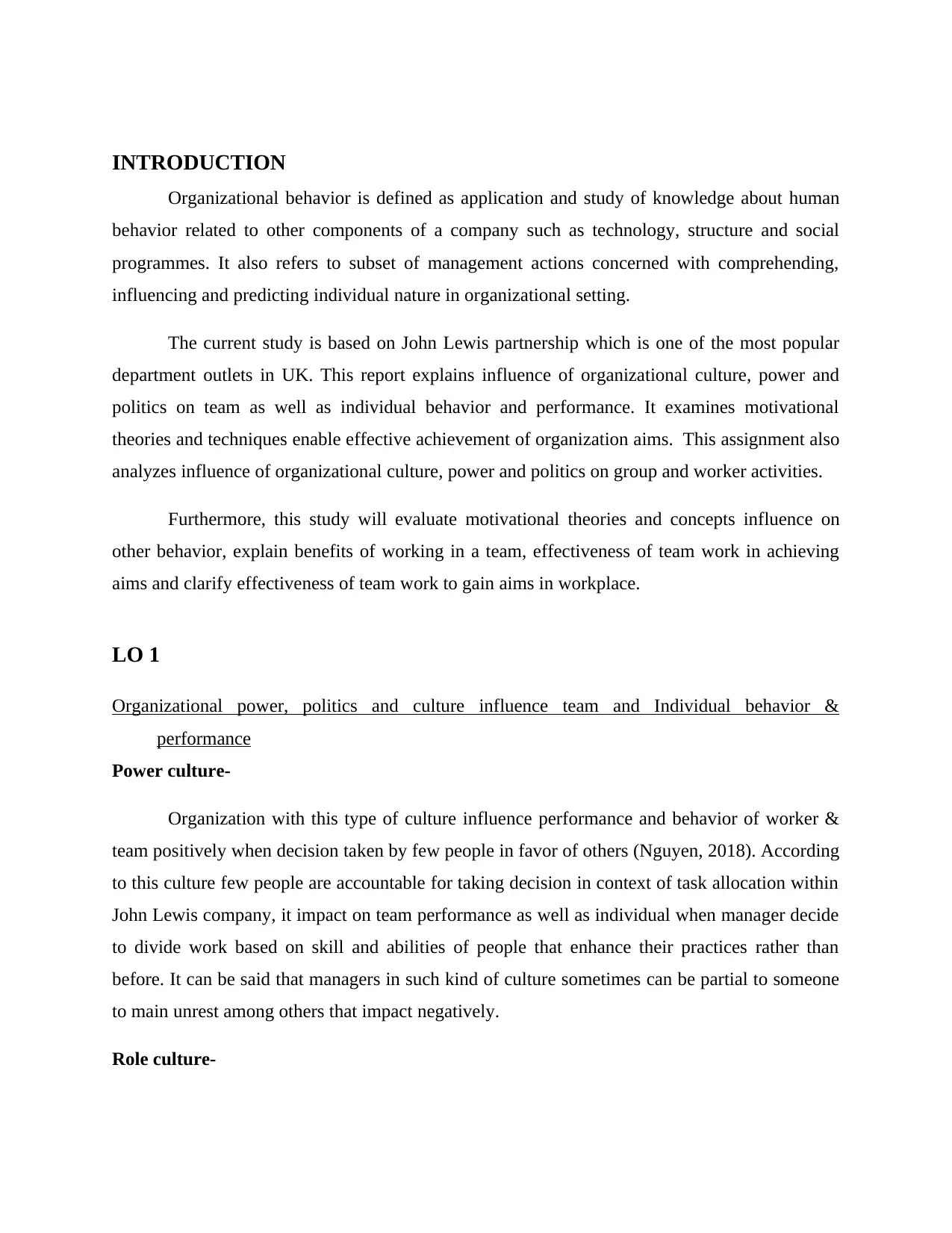
INTRODUCTION
Organizational behavior is defined as application and study of knowledge about human
behavior related to other components of a company such as technology, structure and social
programmes. It also refers to subset of management actions concerned with comprehending,
influencing and predicting individual nature in organizational setting.
The current study is based on John Lewis partnership which is one of the most popular
department outlets in UK. This report explains influence of organizational culture, power and
politics on team as well as individual behavior and performance. It examines motivational
theories and techniques enable effective achievement of organization aims. This assignment also
analyzes influence of organizational culture, power and politics on group and worker activities.
Furthermore, this study will evaluate motivational theories and concepts influence on
other behavior, explain benefits of working in a team, effectiveness of team work in achieving
aims and clarify effectiveness of team work to gain aims in workplace.
LO 1
Organizational power, politics and culture influence team and Individual behavior &
performance
Power culture-
Organization with this type of culture influence performance and behavior of worker &
team positively when decision taken by few people in favor of others (Nguyen, 2018). According
to this culture few people are accountable for taking decision in context of task allocation within
John Lewis company, it impact on team performance as well as individual when manager decide
to divide work based on skill and abilities of people that enhance their practices rather than
before. It can be said that managers in such kind of culture sometimes can be partial to someone
to main unrest among others that impact negatively.
Role culture-
Organizational behavior is defined as application and study of knowledge about human
behavior related to other components of a company such as technology, structure and social
programmes. It also refers to subset of management actions concerned with comprehending,
influencing and predicting individual nature in organizational setting.
The current study is based on John Lewis partnership which is one of the most popular
department outlets in UK. This report explains influence of organizational culture, power and
politics on team as well as individual behavior and performance. It examines motivational
theories and techniques enable effective achievement of organization aims. This assignment also
analyzes influence of organizational culture, power and politics on group and worker activities.
Furthermore, this study will evaluate motivational theories and concepts influence on
other behavior, explain benefits of working in a team, effectiveness of team work in achieving
aims and clarify effectiveness of team work to gain aims in workplace.
LO 1
Organizational power, politics and culture influence team and Individual behavior &
performance
Power culture-
Organization with this type of culture influence performance and behavior of worker &
team positively when decision taken by few people in favor of others (Nguyen, 2018). According
to this culture few people are accountable for taking decision in context of task allocation within
John Lewis company, it impact on team performance as well as individual when manager decide
to divide work based on skill and abilities of people that enhance their practices rather than
before. It can be said that managers in such kind of culture sometimes can be partial to someone
to main unrest among others that impact negatively.
Role culture-
⊘ This is a preview!⊘
Do you want full access?
Subscribe today to unlock all pages.

Trusted by 1+ million students worldwide
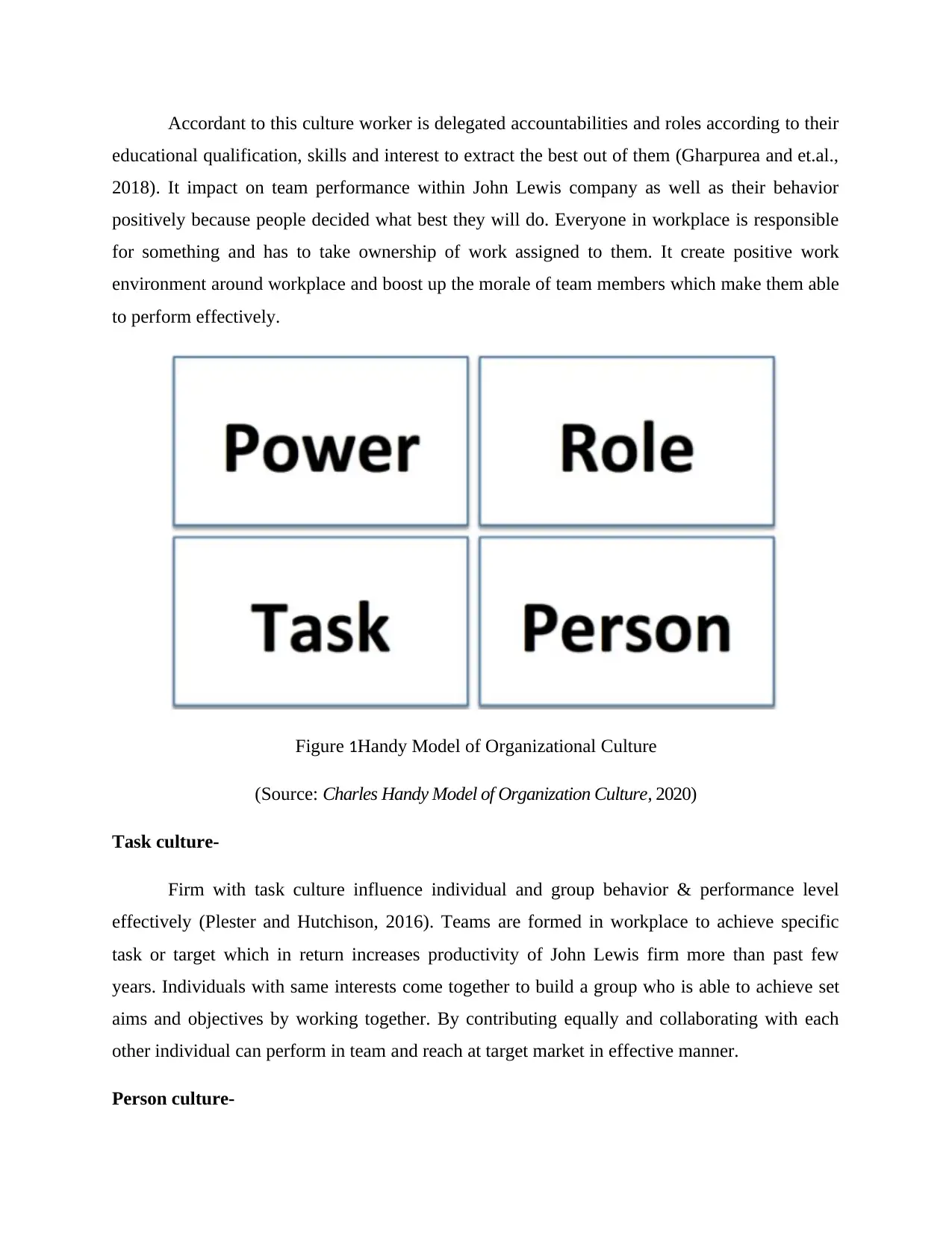
Accordant to this culture worker is delegated accountabilities and roles according to their
educational qualification, skills and interest to extract the best out of them (Gharpurea and et.al.,
2018). It impact on team performance within John Lewis company as well as their behavior
positively because people decided what best they will do. Everyone in workplace is responsible
for something and has to take ownership of work assigned to them. It create positive work
environment around workplace and boost up the morale of team members which make them able
to perform effectively.
Figure 1Handy Model of Organizational Culture
(Source: Charles Handy Model of Organization Culture, 2020)
Task culture-
Firm with task culture influence individual and group behavior & performance level
effectively (Plester and Hutchison, 2016). Teams are formed in workplace to achieve specific
task or target which in return increases productivity of John Lewis firm more than past few
years. Individuals with same interests come together to build a group who is able to achieve set
aims and objectives by working together. By contributing equally and collaborating with each
other individual can perform in team and reach at target market in effective manner.
Person culture-
educational qualification, skills and interest to extract the best out of them (Gharpurea and et.al.,
2018). It impact on team performance within John Lewis company as well as their behavior
positively because people decided what best they will do. Everyone in workplace is responsible
for something and has to take ownership of work assigned to them. It create positive work
environment around workplace and boost up the morale of team members which make them able
to perform effectively.
Figure 1Handy Model of Organizational Culture
(Source: Charles Handy Model of Organization Culture, 2020)
Task culture-
Firm with task culture influence individual and group behavior & performance level
effectively (Plester and Hutchison, 2016). Teams are formed in workplace to achieve specific
task or target which in return increases productivity of John Lewis firm more than past few
years. Individuals with same interests come together to build a group who is able to achieve set
aims and objectives by working together. By contributing equally and collaborating with each
other individual can perform in team and reach at target market in effective manner.
Person culture-
Paraphrase This Document
Need a fresh take? Get an instant paraphrase of this document with our AI Paraphraser
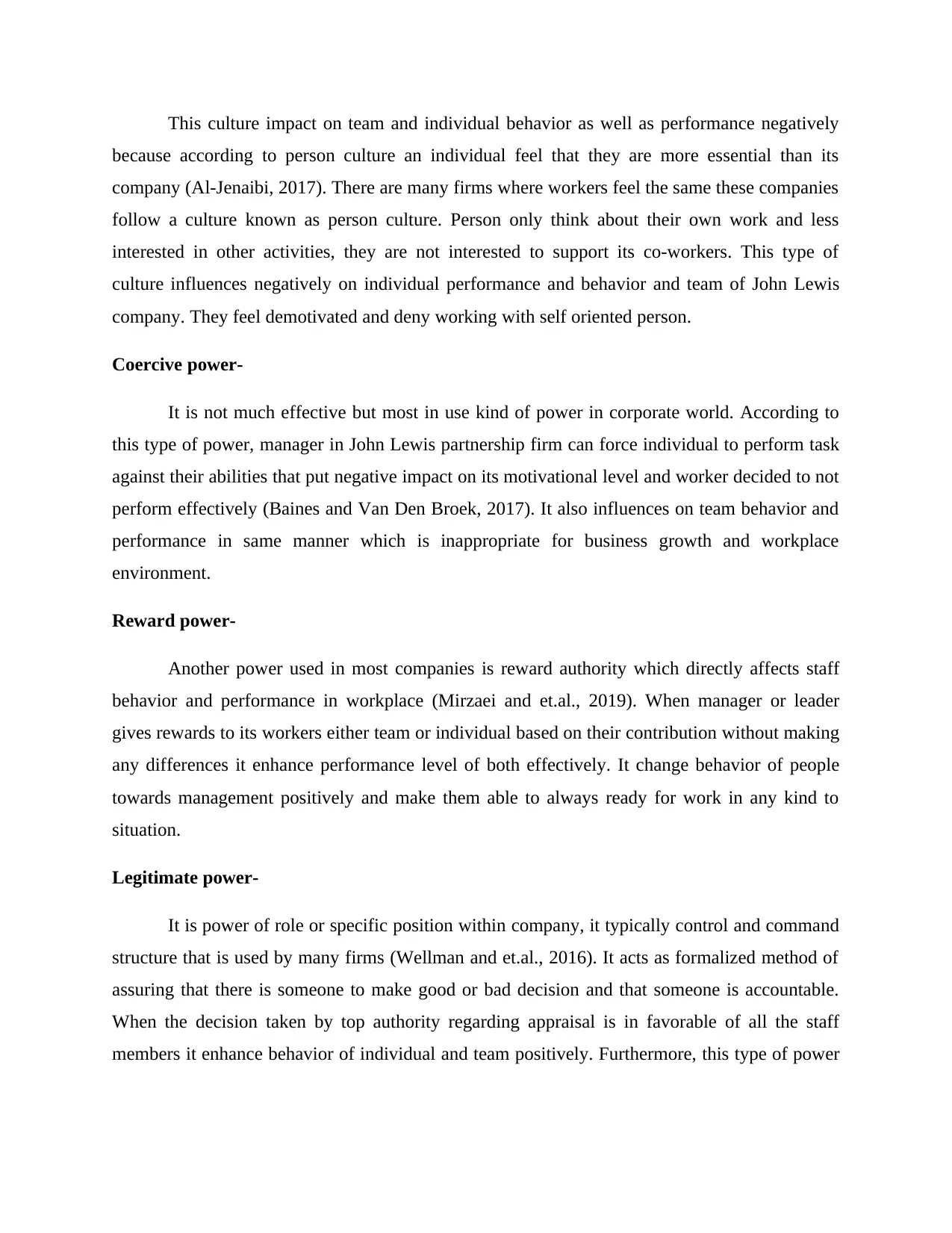
This culture impact on team and individual behavior as well as performance negatively
because according to person culture an individual feel that they are more essential than its
company (Al-Jenaibi, 2017). There are many firms where workers feel the same these companies
follow a culture known as person culture. Person only think about their own work and less
interested in other activities, they are not interested to support its co-workers. This type of
culture influences negatively on individual performance and behavior and team of John Lewis
company. They feel demotivated and deny working with self oriented person.
Coercive power-
It is not much effective but most in use kind of power in corporate world. According to
this type of power, manager in John Lewis partnership firm can force individual to perform task
against their abilities that put negative impact on its motivational level and worker decided to not
perform effectively (Baines and Van Den Broek, 2017). It also influences on team behavior and
performance in same manner which is inappropriate for business growth and workplace
environment.
Reward power-
Another power used in most companies is reward authority which directly affects staff
behavior and performance in workplace (Mirzaei and et.al., 2019). When manager or leader
gives rewards to its workers either team or individual based on their contribution without making
any differences it enhance performance level of both effectively. It change behavior of people
towards management positively and make them able to always ready for work in any kind to
situation.
Legitimate power-
It is power of role or specific position within company, it typically control and command
structure that is used by many firms (Wellman and et.al., 2016). It acts as formalized method of
assuring that there is someone to make good or bad decision and that someone is accountable.
When the decision taken by top authority regarding appraisal is in favorable of all the staff
members it enhance behavior of individual and team positively. Furthermore, this type of power
because according to person culture an individual feel that they are more essential than its
company (Al-Jenaibi, 2017). There are many firms where workers feel the same these companies
follow a culture known as person culture. Person only think about their own work and less
interested in other activities, they are not interested to support its co-workers. This type of
culture influences negatively on individual performance and behavior and team of John Lewis
company. They feel demotivated and deny working with self oriented person.
Coercive power-
It is not much effective but most in use kind of power in corporate world. According to
this type of power, manager in John Lewis partnership firm can force individual to perform task
against their abilities that put negative impact on its motivational level and worker decided to not
perform effectively (Baines and Van Den Broek, 2017). It also influences on team behavior and
performance in same manner which is inappropriate for business growth and workplace
environment.
Reward power-
Another power used in most companies is reward authority which directly affects staff
behavior and performance in workplace (Mirzaei and et.al., 2019). When manager or leader
gives rewards to its workers either team or individual based on their contribution without making
any differences it enhance performance level of both effectively. It change behavior of people
towards management positively and make them able to always ready for work in any kind to
situation.
Legitimate power-
It is power of role or specific position within company, it typically control and command
structure that is used by many firms (Wellman and et.al., 2016). It acts as formalized method of
assuring that there is someone to make good or bad decision and that someone is accountable.
When the decision taken by top authority regarding appraisal is in favorable of all the staff
members it enhance behavior of individual and team positively. Furthermore, this type of power
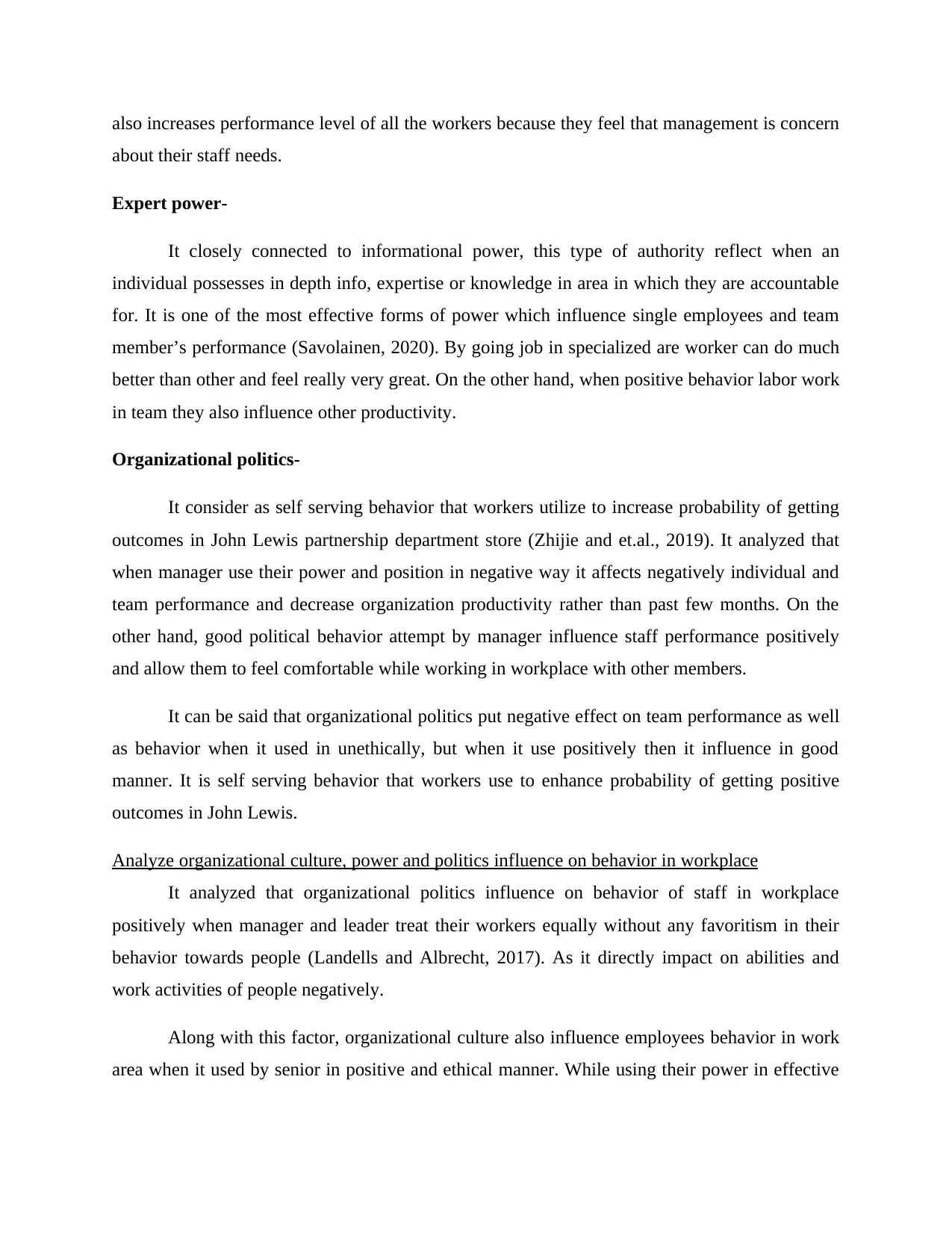
also increases performance level of all the workers because they feel that management is concern
about their staff needs.
Expert power-
It closely connected to informational power, this type of authority reflect when an
individual possesses in depth info, expertise or knowledge in area in which they are accountable
for. It is one of the most effective forms of power which influence single employees and team
member’s performance (Savolainen, 2020). By going job in specialized are worker can do much
better than other and feel really very great. On the other hand, when positive behavior labor work
in team they also influence other productivity.
Organizational politics-
It consider as self serving behavior that workers utilize to increase probability of getting
outcomes in John Lewis partnership department store (Zhijie and et.al., 2019). It analyzed that
when manager use their power and position in negative way it affects negatively individual and
team performance and decrease organization productivity rather than past few months. On the
other hand, good political behavior attempt by manager influence staff performance positively
and allow them to feel comfortable while working in workplace with other members.
It can be said that organizational politics put negative effect on team performance as well
as behavior when it used in unethically, but when it use positively then it influence in good
manner. It is self serving behavior that workers use to enhance probability of getting positive
outcomes in John Lewis.
Analyze organizational culture, power and politics influence on behavior in workplace
It analyzed that organizational politics influence on behavior of staff in workplace
positively when manager and leader treat their workers equally without any favoritism in their
behavior towards people (Landells and Albrecht, 2017). As it directly impact on abilities and
work activities of people negatively.
Along with this factor, organizational culture also influence employees behavior in work
area when it used by senior in positive and ethical manner. While using their power in effective
about their staff needs.
Expert power-
It closely connected to informational power, this type of authority reflect when an
individual possesses in depth info, expertise or knowledge in area in which they are accountable
for. It is one of the most effective forms of power which influence single employees and team
member’s performance (Savolainen, 2020). By going job in specialized are worker can do much
better than other and feel really very great. On the other hand, when positive behavior labor work
in team they also influence other productivity.
Organizational politics-
It consider as self serving behavior that workers utilize to increase probability of getting
outcomes in John Lewis partnership department store (Zhijie and et.al., 2019). It analyzed that
when manager use their power and position in negative way it affects negatively individual and
team performance and decrease organization productivity rather than past few months. On the
other hand, good political behavior attempt by manager influence staff performance positively
and allow them to feel comfortable while working in workplace with other members.
It can be said that organizational politics put negative effect on team performance as well
as behavior when it used in unethically, but when it use positively then it influence in good
manner. It is self serving behavior that workers use to enhance probability of getting positive
outcomes in John Lewis.
Analyze organizational culture, power and politics influence on behavior in workplace
It analyzed that organizational politics influence on behavior of staff in workplace
positively when manager and leader treat their workers equally without any favoritism in their
behavior towards people (Landells and Albrecht, 2017). As it directly impact on abilities and
work activities of people negatively.
Along with this factor, organizational culture also influence employees behavior in work
area when it used by senior in positive and ethical manner. While using their power in effective
⊘ This is a preview!⊘
Do you want full access?
Subscribe today to unlock all pages.

Trusted by 1+ million students worldwide
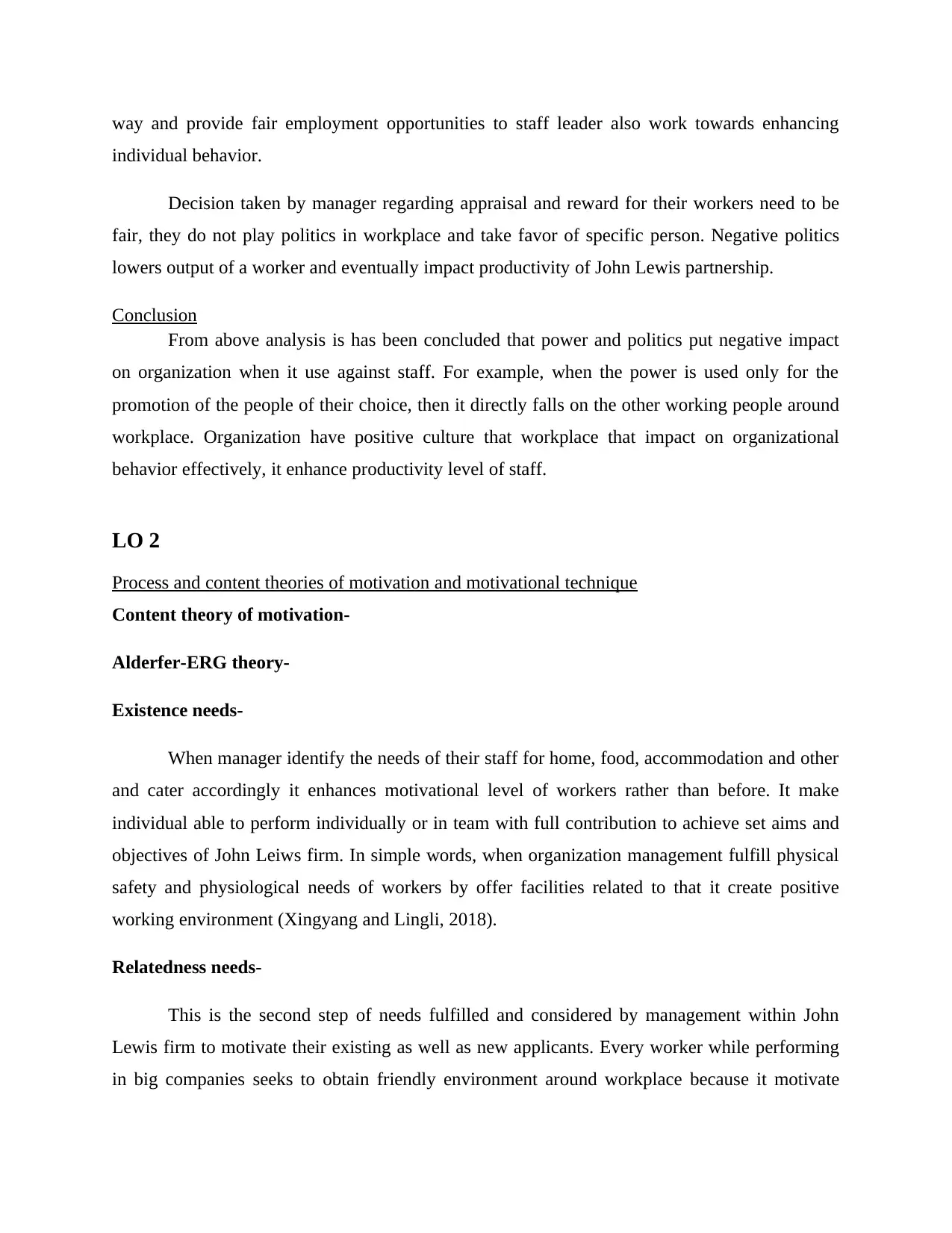
way and provide fair employment opportunities to staff leader also work towards enhancing
individual behavior.
Decision taken by manager regarding appraisal and reward for their workers need to be
fair, they do not play politics in workplace and take favor of specific person. Negative politics
lowers output of a worker and eventually impact productivity of John Lewis partnership.
Conclusion
From above analysis is has been concluded that power and politics put negative impact
on organization when it use against staff. For example, when the power is used only for the
promotion of the people of their choice, then it directly falls on the other working people around
workplace. Organization have positive culture that workplace that impact on organizational
behavior effectively, it enhance productivity level of staff.
LO 2
Process and content theories of motivation and motivational technique
Content theory of motivation-
Alderfer-ERG theory-
Existence needs-
When manager identify the needs of their staff for home, food, accommodation and other
and cater accordingly it enhances motivational level of workers rather than before. It make
individual able to perform individually or in team with full contribution to achieve set aims and
objectives of John Leiws firm. In simple words, when organization management fulfill physical
safety and physiological needs of workers by offer facilities related to that it create positive
working environment (Xingyang and Lingli, 2018).
Relatedness needs-
This is the second step of needs fulfilled and considered by management within John
Lewis firm to motivate their existing as well as new applicants. Every worker while performing
in big companies seeks to obtain friendly environment around workplace because it motivate
individual behavior.
Decision taken by manager regarding appraisal and reward for their workers need to be
fair, they do not play politics in workplace and take favor of specific person. Negative politics
lowers output of a worker and eventually impact productivity of John Lewis partnership.
Conclusion
From above analysis is has been concluded that power and politics put negative impact
on organization when it use against staff. For example, when the power is used only for the
promotion of the people of their choice, then it directly falls on the other working people around
workplace. Organization have positive culture that workplace that impact on organizational
behavior effectively, it enhance productivity level of staff.
LO 2
Process and content theories of motivation and motivational technique
Content theory of motivation-
Alderfer-ERG theory-
Existence needs-
When manager identify the needs of their staff for home, food, accommodation and other
and cater accordingly it enhances motivational level of workers rather than before. It make
individual able to perform individually or in team with full contribution to achieve set aims and
objectives of John Leiws firm. In simple words, when organization management fulfill physical
safety and physiological needs of workers by offer facilities related to that it create positive
working environment (Xingyang and Lingli, 2018).
Relatedness needs-
This is the second step of needs fulfilled and considered by management within John
Lewis firm to motivate their existing as well as new applicants. Every worker while performing
in big companies seeks to obtain friendly environment around workplace because it motivate
Paraphrase This Document
Need a fresh take? Get an instant paraphrase of this document with our AI Paraphraser
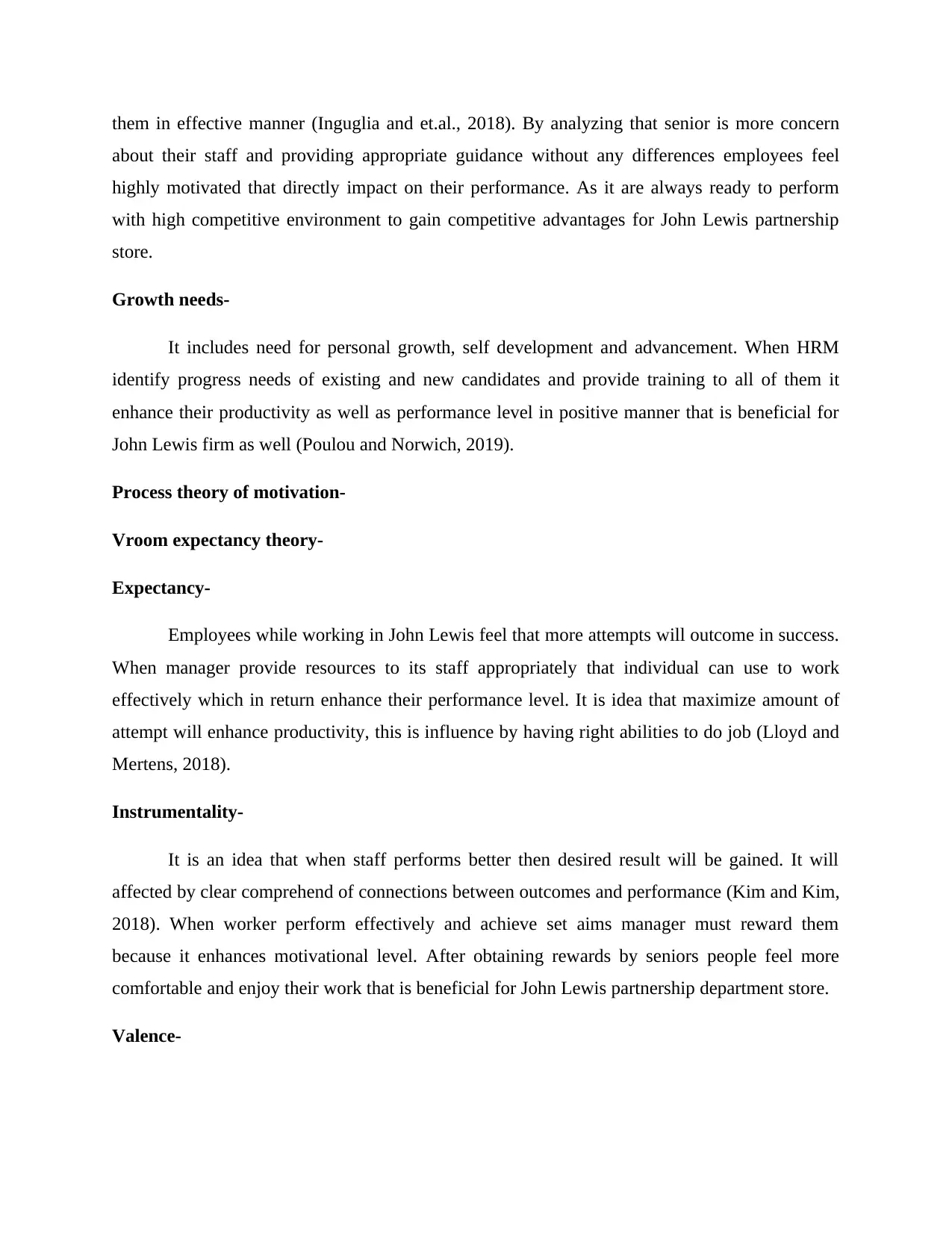
them in effective manner (Inguglia and et.al., 2018). By analyzing that senior is more concern
about their staff and providing appropriate guidance without any differences employees feel
highly motivated that directly impact on their performance. As it are always ready to perform
with high competitive environment to gain competitive advantages for John Lewis partnership
store.
Growth needs-
It includes need for personal growth, self development and advancement. When HRM
identify progress needs of existing and new candidates and provide training to all of them it
enhance their productivity as well as performance level in positive manner that is beneficial for
John Lewis firm as well (Poulou and Norwich, 2019).
Process theory of motivation-
Vroom expectancy theory-
Expectancy-
Employees while working in John Lewis feel that more attempts will outcome in success.
When manager provide resources to its staff appropriately that individual can use to work
effectively which in return enhance their performance level. It is idea that maximize amount of
attempt will enhance productivity, this is influence by having right abilities to do job (Lloyd and
Mertens, 2018).
Instrumentality-
It is an idea that when staff performs better then desired result will be gained. It will
affected by clear comprehend of connections between outcomes and performance (Kim and Kim,
2018). When worker perform effectively and achieve set aims manager must reward them
because it enhances motivational level. After obtaining rewards by seniors people feel more
comfortable and enjoy their work that is beneficial for John Lewis partnership department store.
Valence-
about their staff and providing appropriate guidance without any differences employees feel
highly motivated that directly impact on their performance. As it are always ready to perform
with high competitive environment to gain competitive advantages for John Lewis partnership
store.
Growth needs-
It includes need for personal growth, self development and advancement. When HRM
identify progress needs of existing and new candidates and provide training to all of them it
enhance their productivity as well as performance level in positive manner that is beneficial for
John Lewis firm as well (Poulou and Norwich, 2019).
Process theory of motivation-
Vroom expectancy theory-
Expectancy-
Employees while working in John Lewis feel that more attempts will outcome in success.
When manager provide resources to its staff appropriately that individual can use to work
effectively which in return enhance their performance level. It is idea that maximize amount of
attempt will enhance productivity, this is influence by having right abilities to do job (Lloyd and
Mertens, 2018).
Instrumentality-
It is an idea that when staff performs better then desired result will be gained. It will
affected by clear comprehend of connections between outcomes and performance (Kim and Kim,
2018). When worker perform effectively and achieve set aims manager must reward them
because it enhances motivational level. After obtaining rewards by seniors people feel more
comfortable and enjoy their work that is beneficial for John Lewis partnership department store.
Valence-
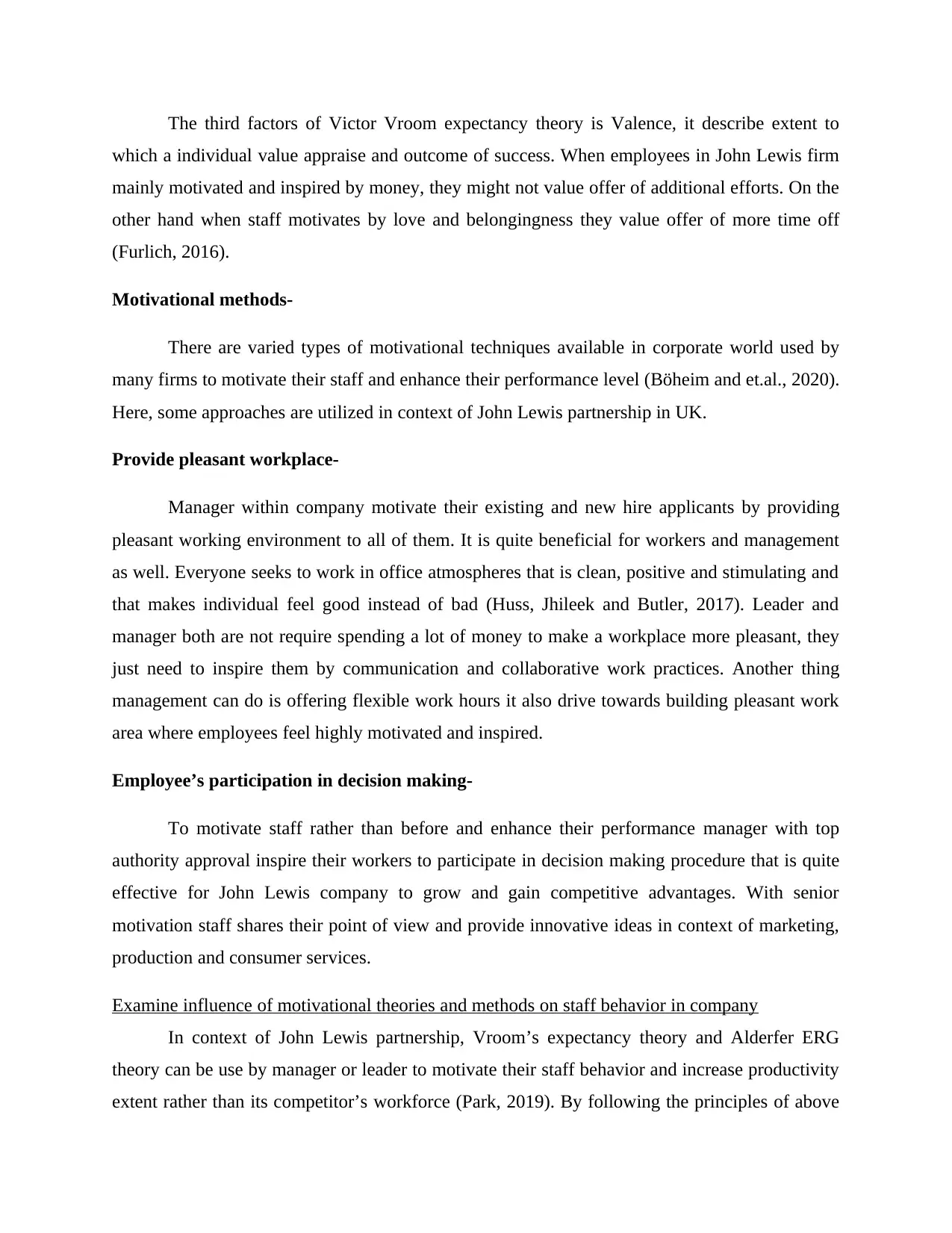
The third factors of Victor Vroom expectancy theory is Valence, it describe extent to
which a individual value appraise and outcome of success. When employees in John Lewis firm
mainly motivated and inspired by money, they might not value offer of additional efforts. On the
other hand when staff motivates by love and belongingness they value offer of more time off
(Furlich, 2016).
Motivational methods-
There are varied types of motivational techniques available in corporate world used by
many firms to motivate their staff and enhance their performance level (Böheim and et.al., 2020).
Here, some approaches are utilized in context of John Lewis partnership in UK.
Provide pleasant workplace-
Manager within company motivate their existing and new hire applicants by providing
pleasant working environment to all of them. It is quite beneficial for workers and management
as well. Everyone seeks to work in office atmospheres that is clean, positive and stimulating and
that makes individual feel good instead of bad (Huss, Jhileek and Butler, 2017). Leader and
manager both are not require spending a lot of money to make a workplace more pleasant, they
just need to inspire them by communication and collaborative work practices. Another thing
management can do is offering flexible work hours it also drive towards building pleasant work
area where employees feel highly motivated and inspired.
Employee’s participation in decision making-
To motivate staff rather than before and enhance their performance manager with top
authority approval inspire their workers to participate in decision making procedure that is quite
effective for John Lewis company to grow and gain competitive advantages. With senior
motivation staff shares their point of view and provide innovative ideas in context of marketing,
production and consumer services.
Examine influence of motivational theories and methods on staff behavior in company
In context of John Lewis partnership, Vroom’s expectancy theory and Alderfer ERG
theory can be use by manager or leader to motivate their staff behavior and increase productivity
extent rather than its competitor’s workforce (Park, 2019). By following the principles of above
which a individual value appraise and outcome of success. When employees in John Lewis firm
mainly motivated and inspired by money, they might not value offer of additional efforts. On the
other hand when staff motivates by love and belongingness they value offer of more time off
(Furlich, 2016).
Motivational methods-
There are varied types of motivational techniques available in corporate world used by
many firms to motivate their staff and enhance their performance level (Böheim and et.al., 2020).
Here, some approaches are utilized in context of John Lewis partnership in UK.
Provide pleasant workplace-
Manager within company motivate their existing and new hire applicants by providing
pleasant working environment to all of them. It is quite beneficial for workers and management
as well. Everyone seeks to work in office atmospheres that is clean, positive and stimulating and
that makes individual feel good instead of bad (Huss, Jhileek and Butler, 2017). Leader and
manager both are not require spending a lot of money to make a workplace more pleasant, they
just need to inspire them by communication and collaborative work practices. Another thing
management can do is offering flexible work hours it also drive towards building pleasant work
area where employees feel highly motivated and inspired.
Employee’s participation in decision making-
To motivate staff rather than before and enhance their performance manager with top
authority approval inspire their workers to participate in decision making procedure that is quite
effective for John Lewis company to grow and gain competitive advantages. With senior
motivation staff shares their point of view and provide innovative ideas in context of marketing,
production and consumer services.
Examine influence of motivational theories and methods on staff behavior in company
In context of John Lewis partnership, Vroom’s expectancy theory and Alderfer ERG
theory can be use by manager or leader to motivate their staff behavior and increase productivity
extent rather than its competitor’s workforce (Park, 2019). By following the principles of above
⊘ This is a preview!⊘
Do you want full access?
Subscribe today to unlock all pages.

Trusted by 1+ million students worldwide
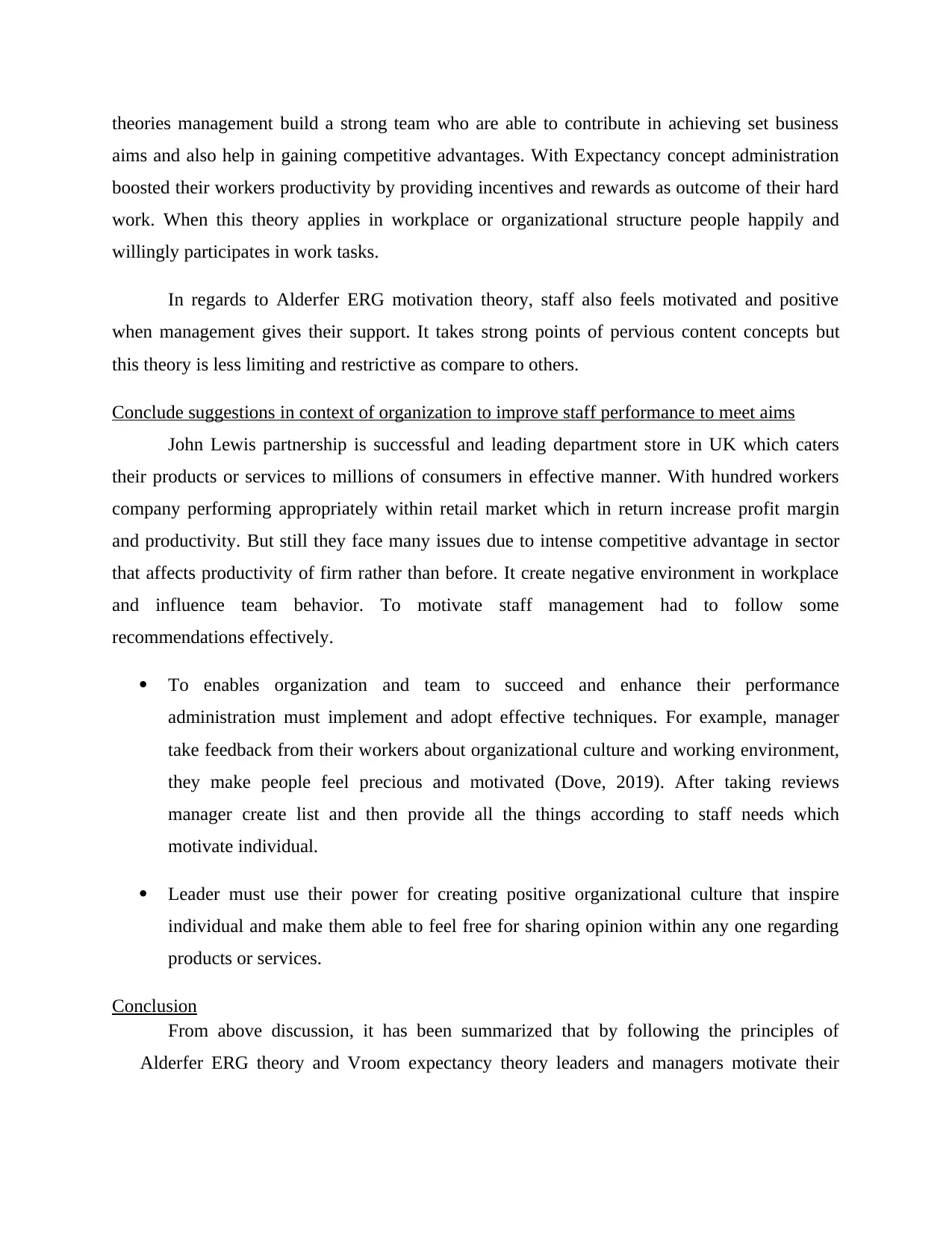
theories management build a strong team who are able to contribute in achieving set business
aims and also help in gaining competitive advantages. With Expectancy concept administration
boosted their workers productivity by providing incentives and rewards as outcome of their hard
work. When this theory applies in workplace or organizational structure people happily and
willingly participates in work tasks.
In regards to Alderfer ERG motivation theory, staff also feels motivated and positive
when management gives their support. It takes strong points of pervious content concepts but
this theory is less limiting and restrictive as compare to others.
Conclude suggestions in context of organization to improve staff performance to meet aims
John Lewis partnership is successful and leading department store in UK which caters
their products or services to millions of consumers in effective manner. With hundred workers
company performing appropriately within retail market which in return increase profit margin
and productivity. But still they face many issues due to intense competitive advantage in sector
that affects productivity of firm rather than before. It create negative environment in workplace
and influence team behavior. To motivate staff management had to follow some
recommendations effectively.
To enables organization and team to succeed and enhance their performance
administration must implement and adopt effective techniques. For example, manager
take feedback from their workers about organizational culture and working environment,
they make people feel precious and motivated (Dove, 2019). After taking reviews
manager create list and then provide all the things according to staff needs which
motivate individual.
Leader must use their power for creating positive organizational culture that inspire
individual and make them able to feel free for sharing opinion within any one regarding
products or services.
Conclusion
From above discussion, it has been summarized that by following the principles of
Alderfer ERG theory and Vroom expectancy theory leaders and managers motivate their
aims and also help in gaining competitive advantages. With Expectancy concept administration
boosted their workers productivity by providing incentives and rewards as outcome of their hard
work. When this theory applies in workplace or organizational structure people happily and
willingly participates in work tasks.
In regards to Alderfer ERG motivation theory, staff also feels motivated and positive
when management gives their support. It takes strong points of pervious content concepts but
this theory is less limiting and restrictive as compare to others.
Conclude suggestions in context of organization to improve staff performance to meet aims
John Lewis partnership is successful and leading department store in UK which caters
their products or services to millions of consumers in effective manner. With hundred workers
company performing appropriately within retail market which in return increase profit margin
and productivity. But still they face many issues due to intense competitive advantage in sector
that affects productivity of firm rather than before. It create negative environment in workplace
and influence team behavior. To motivate staff management had to follow some
recommendations effectively.
To enables organization and team to succeed and enhance their performance
administration must implement and adopt effective techniques. For example, manager
take feedback from their workers about organizational culture and working environment,
they make people feel precious and motivated (Dove, 2019). After taking reviews
manager create list and then provide all the things according to staff needs which
motivate individual.
Leader must use their power for creating positive organizational culture that inspire
individual and make them able to feel free for sharing opinion within any one regarding
products or services.
Conclusion
From above discussion, it has been summarized that by following the principles of
Alderfer ERG theory and Vroom expectancy theory leaders and managers motivate their
Paraphrase This Document
Need a fresh take? Get an instant paraphrase of this document with our AI Paraphraser
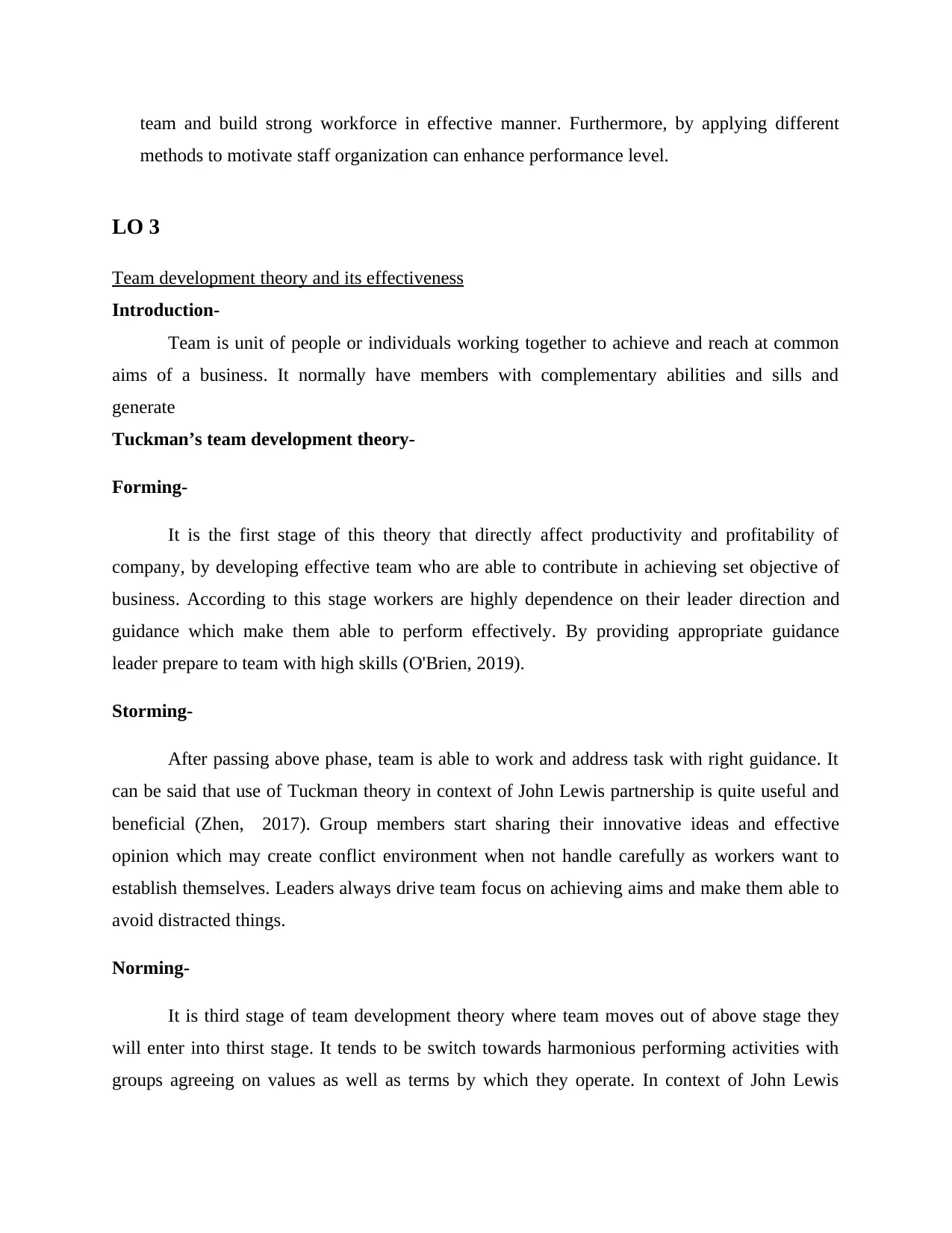
team and build strong workforce in effective manner. Furthermore, by applying different
methods to motivate staff organization can enhance performance level.
LO 3
Team development theory and its effectiveness
Introduction-
Team is unit of people or individuals working together to achieve and reach at common
aims of a business. It normally have members with complementary abilities and sills and
generate
Tuckman’s team development theory-
Forming-
It is the first stage of this theory that directly affect productivity and profitability of
company, by developing effective team who are able to contribute in achieving set objective of
business. According to this stage workers are highly dependence on their leader direction and
guidance which make them able to perform effectively. By providing appropriate guidance
leader prepare to team with high skills (O'Brien, 2019).
Storming-
After passing above phase, team is able to work and address task with right guidance. It
can be said that use of Tuckman theory in context of John Lewis partnership is quite useful and
beneficial (Zhen, 2017). Group members start sharing their innovative ideas and effective
opinion which may create conflict environment when not handle carefully as workers want to
establish themselves. Leaders always drive team focus on achieving aims and make them able to
avoid distracted things.
Norming-
It is third stage of team development theory where team moves out of above stage they
will enter into thirst stage. It tends to be switch towards harmonious performing activities with
groups agreeing on values as well as terms by which they operate. In context of John Lewis
methods to motivate staff organization can enhance performance level.
LO 3
Team development theory and its effectiveness
Introduction-
Team is unit of people or individuals working together to achieve and reach at common
aims of a business. It normally have members with complementary abilities and sills and
generate
Tuckman’s team development theory-
Forming-
It is the first stage of this theory that directly affect productivity and profitability of
company, by developing effective team who are able to contribute in achieving set objective of
business. According to this stage workers are highly dependence on their leader direction and
guidance which make them able to perform effectively. By providing appropriate guidance
leader prepare to team with high skills (O'Brien, 2019).
Storming-
After passing above phase, team is able to work and address task with right guidance. It
can be said that use of Tuckman theory in context of John Lewis partnership is quite useful and
beneficial (Zhen, 2017). Group members start sharing their innovative ideas and effective
opinion which may create conflict environment when not handle carefully as workers want to
establish themselves. Leaders always drive team focus on achieving aims and make them able to
avoid distracted things.
Norming-
It is third stage of team development theory where team moves out of above stage they
will enter into thirst stage. It tends to be switch towards harmonious performing activities with
groups agreeing on values as well as terms by which they operate. In context of John Lewis
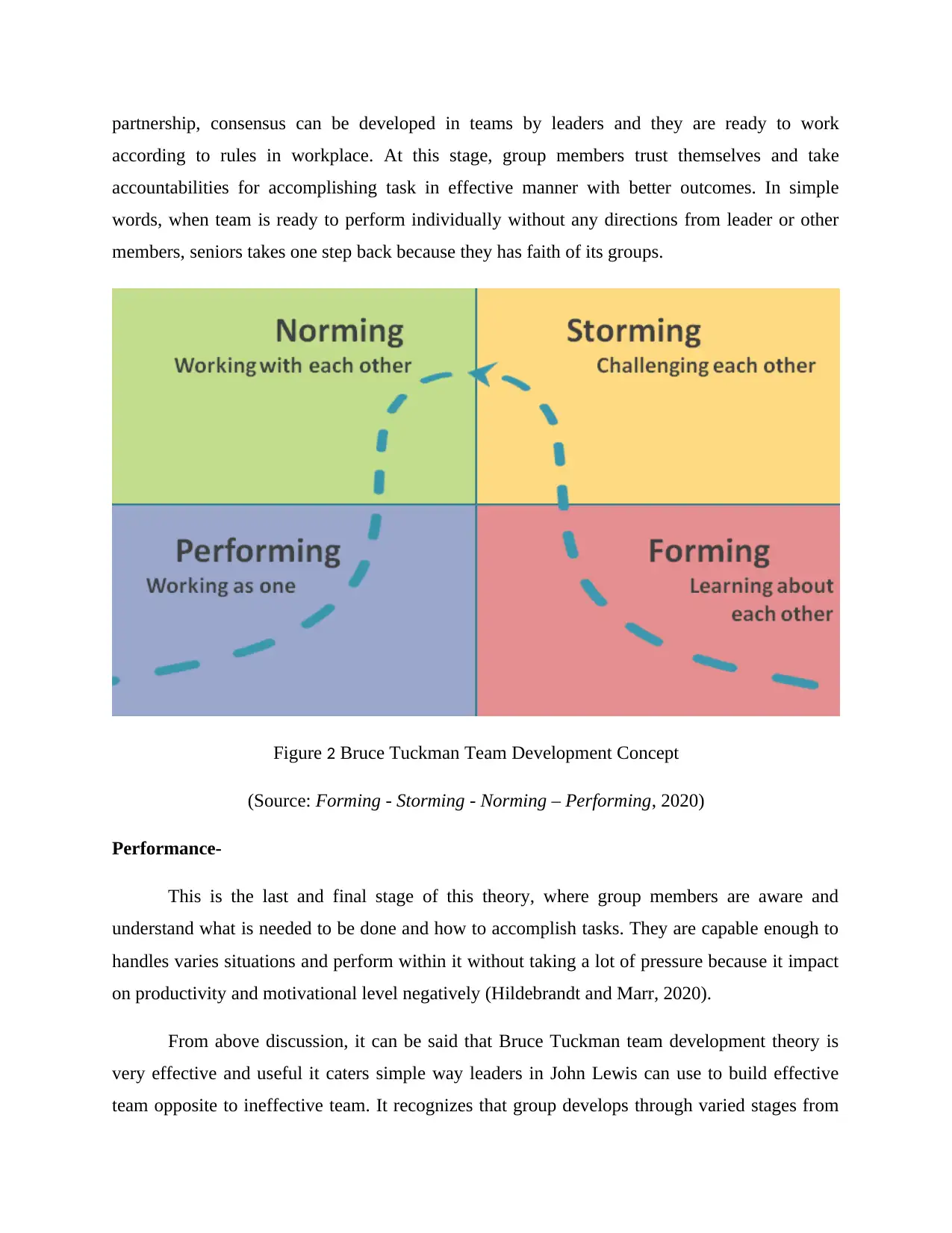
partnership, consensus can be developed in teams by leaders and they are ready to work
according to rules in workplace. At this stage, group members trust themselves and take
accountabilities for accomplishing task in effective manner with better outcomes. In simple
words, when team is ready to perform individually without any directions from leader or other
members, seniors takes one step back because they has faith of its groups.
Figure 2 Bruce Tuckman Team Development Concept
(Source: Forming - Storming - Norming – Performing, 2020)
Performance-
This is the last and final stage of this theory, where group members are aware and
understand what is needed to be done and how to accomplish tasks. They are capable enough to
handles varies situations and perform within it without taking a lot of pressure because it impact
on productivity and motivational level negatively (Hildebrandt and Marr, 2020).
From above discussion, it can be said that Bruce Tuckman team development theory is
very effective and useful it caters simple way leaders in John Lewis can use to build effective
team opposite to ineffective team. It recognizes that group develops through varied stages from
according to rules in workplace. At this stage, group members trust themselves and take
accountabilities for accomplishing task in effective manner with better outcomes. In simple
words, when team is ready to perform individually without any directions from leader or other
members, seniors takes one step back because they has faith of its groups.
Figure 2 Bruce Tuckman Team Development Concept
(Source: Forming - Storming - Norming – Performing, 2020)
Performance-
This is the last and final stage of this theory, where group members are aware and
understand what is needed to be done and how to accomplish tasks. They are capable enough to
handles varies situations and perform within it without taking a lot of pressure because it impact
on productivity and motivational level negatively (Hildebrandt and Marr, 2020).
From above discussion, it can be said that Bruce Tuckman team development theory is
very effective and useful it caters simple way leaders in John Lewis can use to build effective
team opposite to ineffective team. It recognizes that group develops through varied stages from
⊘ This is a preview!⊘
Do you want full access?
Subscribe today to unlock all pages.

Trusted by 1+ million students worldwide
1 out of 22
Related Documents
Your All-in-One AI-Powered Toolkit for Academic Success.
+13062052269
info@desklib.com
Available 24*7 on WhatsApp / Email
![[object Object]](/_next/static/media/star-bottom.7253800d.svg)
Unlock your academic potential
Copyright © 2020–2026 A2Z Services. All Rights Reserved. Developed and managed by ZUCOL.





